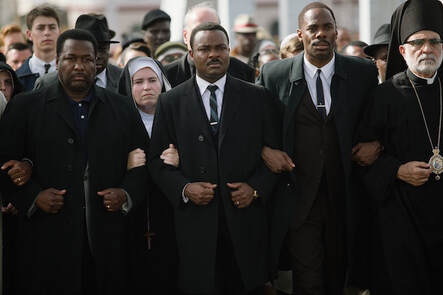A- | Martin Luther King Jr organizes a march for voting rights in Selma, Alabama. Directed by Ava Duvernay Starring David Oyelowo, Carmen Ejogo, and Tom Wilkinson Review by Jon Kissel |

While MLK is being shown at the height of his powers, Duvernay is juxtaposing his adulation with the moments immediately before the Birmingham Baptist Church explodes, killing four small girls. This is followed up with Selma citizen Annie Lee Cooper (Oprah Winfrey) unsuccessfully submitting to a literacy test for what's implied as the umpteenth time. For all of King’s renown and his success, terrorism is still rampant in the south and its African-American citizens are unable to exercise their basic rights. MLK, having recently achieved legislative success with the Civil Rights Act, goes back to President Johnson (Tom Wilkinson) and insists on going forward with the Voting Rights Act necessary to enable full citizenship for all. Johnson is unwilling to spend the political capital so soon after the Civil Rights Act, and MLK takes steps to force his hand. Enter Selma, Alabama, a city with a large African-American population and no representation, and, most importantly for the savvy MLK, a bloodthirsty sheriff with no self-control. The March on Selma, designed to drag violent responses out of law enforcement who gladly oblige, is covered nationally and the resulting outcry forces Johnson’s hand.
The political and historical aspects of Selma have drawn controversy, but it's wholly irrelevant to the actual film. LBJ is depicted as wanting to put off voting rights, and he makes a good argument for why it may have to wait. The inclusion of famous asshole J. Edgar Hoover (Dylan Baker) makes LBJ a shadier character, but the surveillance of MLK is well-known fact and something Duvernay reminds the viewer of with FBI notes under the beginnings of many scenes. In the film's only negative, the synching of the timeline between Washington and Selma gets muddled, even with the timestamps. More interestingly, MLK's tactics, though used for a noble purpose, are built on a foundation of sacrificial lambs, such that deaths following riots are treated as a crisi-tunity. Oyelowo shows plenty of grief over those murdered as an oblique result of his activism, but he also allows for the off-screen likelihood that he can’t believe everything is going according to plan. Again, like Lincoln, the often-ugly realities of making societal change are included. Lastly, the scenes of protestors and marchers being run down by bull-whip wielding cops are raw and powerful, inspiring that fist-clenching sense of injustice generated by similarly-themed films like Fruitvale Station or 12 Years a Slave.
Selma is a great work by Duvernay with multiple different volumes, from the two-person drama between MLK and Coretta to the grand, extras-stuffed scenes in the last act. It also has some of the best final scene chyrons of any similar film, choosing to leaven triumph with tragedy til the last frame. MLK doesn’t really have another victory after this moment, and the seeds of his failures i.e. a complete resistance of the populace to tolerate an argument from him that includes class alongside race are included in his final speech, written for the film instead of pulled from the man himself. Duvernay must have been heavily pulled towards pure uplift in these final moments, and by resisting that urge, she makes her film truer and better as a result. A-
 RSS Feed
RSS Feed